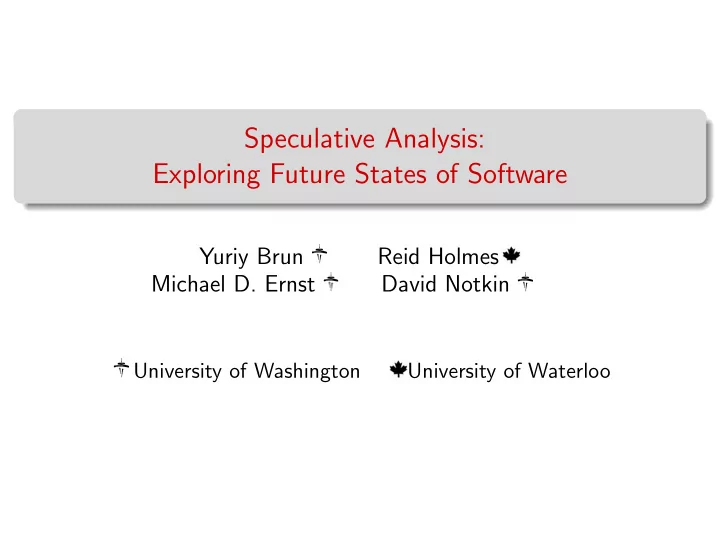

Speculative Analysis: Exploring Future States of Software Yuriy Brun Reid Holmes Michael D. Ernst David Notkin University of Washington University of Waterloo
Have you ever made a mistake while programming and only realized it later? • design decision • refactoring • repeated someone else’s work
speculative analysis collaborative conflicts contributions Speculative analysis: Predict the future and analyze it current program 3 / 14
speculative analysis collaborative conflicts contributions Speculative analysis: Predict the future and analyze it speculate current program 3 / 14
speculative analysis collaborative conflicts contributions Speculative analysis: Predict the future and analyze it speculate current program 3 / 14
speculative analysis collaborative conflicts contributions Speculative analysis: Predict the future and analyze it speculate current program 3 / 14
speculative analysis collaborative conflicts contributions Speculative analysis: Predict the future and analyze it speculate current program analyze 3 / 14
speculative analysis collaborative conflicts contributions Speculative analysis: Predict the future and analyze it speculate current program analyze inform developer 3 / 14
speculative analysis collaborative conflicts contributions Speculative Quick Fix 4 / 14
speculative analysis collaborative conflicts contributions Speculative Quick Fix 4 / 14
speculative analysis collaborative conflicts contributions Speculative Quick Fix 4 / 14
speculative analysis collaborative conflicts contributions Speculative Quick Fix 4 / 14
speculative analysis collaborative conflicts contributions Contributions Speculative analysis Speculative analysis for collaborative development Crystal: prototype tool Problem space ideal for search-based solutions 5 / 14
speculative analysis collaborative conflicts contributions The Gates conflict M 6 / 14
speculative analysis collaborative conflicts contributions The Gates conflict M T 6 / 14
speculative analysis collaborative conflicts contributions The Gates conflict M T W 6 / 14
speculative analysis collaborative conflicts contributions The Gates conflict M T W Th 6 / 14
speculative analysis collaborative conflicts contributions The Gates conflict M T W Th F 6 / 14
speculative analysis collaborative conflicts contributions The Gates conflict M T W Th F M T 6 / 14
speculative analysis collaborative conflicts contributions The Gates conflict M T W Th F M T W Th 6 / 14
speculative analysis collaborative conflicts contributions The Gates conflict M T W Th F M T W Th F 6 / 14
speculative analysis collaborative conflicts contributions The Gates conflict M T W Th F M T W Th F M T 6 / 14
speculative analysis collaborative conflicts contributions The Gates conflict M T W Th F M T W Th F M T W 6 / 14
speculative analysis collaborative conflicts contributions The Gates conflict M T W Th F M T W Th F M T W The information was all there, but the developers didn’t know it. 6 / 14
speculative analysis collaborative conflicts contributions What could well-informed developers do? M T Avoid conflicts 7 / 14
speculative analysis collaborative conflicts contributions What could well-informed developers do? M T Avoid conflicts W Th F M T W Th Reduce conflict severity F 7 / 14
speculative analysis collaborative conflicts contributions Introducing Crystal: A proactive conflict detector DEMO 8 / 14
speculative analysis collaborative conflicts contributions Introducing Crystal: A proactive conflict detector DEMO http://crystalvc.googlecode.com 8 / 14
speculative analysis collaborative conflicts contributions Speculative analysis in collaborative development speculate current program analyze inform developer 9 / 14
speculative analysis collaborative conflicts contributions Reducing false positives in conflict prediction Collaborative awareness Palant´ ır [Sarma et al. 2003] CollabVS [Dewan and Hegde 2007] FASTDash [Biehl et al. 2007] Safe-commit [Wloka et al. 2009] Syde [Hattori and Lanza 2010] SourceTree [Streeting 2010] 10 / 14
speculative analysis collaborative conflicts contributions Reducing false positives in conflict prediction Collaborative awareness Palant´ ır [Sarma et al. 2003] CollabVS [Dewan and Hegde 2007] FASTDash [Biehl et al. 2007] Safe-commit [Wloka et al. 2009] Syde [Hattori and Lanza 2010] SourceTree [Streeting 2010] Crystal analyzes concrete artifacts , eliminating false positives and false negatives. 10 / 14
speculative analysis collaborative conflicts contributions Utility of proactive collaborative conflict detection Are textual collaborative conflicts a real problem? 16% of the merges have textual conflicts. Conflicts live a mean of 9.8 days. How dangerous are safe merges? 93% of textual conflicts developed from safe merges. 20% of textually-safe merges developed into conflicts. Do higher-order collaborative conflicts exist? One in three conflicts are of higher-order. [Brun et al. 2011] 11 / 14
speculative analysis collaborative conflicts contributions Crystal is in the wild “Crystal handles several projects and users effortlessly and presents the necessary information in a simple and understandable way.” – a user Microsoft Beacon A centralized version control-based tool. Microsoft product groups will use Beacon to help identify conflicts earlier in the development process. We will conduct user studies to measure effects on developers. 12 / 14
Open problem: How to search speculative analysis’ many possible futures?
speculative analysis collaborative conflicts contributions Contributions Introduced speculative analysis to guide future actions. Developed Crystal to precisely detect conflicts and unobtrusively inform developers. Identified a problem space ideal for search-based solutions. http://crystalvc.googlecode.com 14 / 14
Jacob T. Biehl, Mary Czerwinski, Greg Smith, and George G. Robertson. FASTDash: A visual dashboard for fostering awareness in software teams. pages 1313–1322, San Jose, CA, USA, 2007. ISBN 978-1-59593-593-9. doi: 10.1145/1240624.1240823 . Yuriy Brun, Reid Holmes, Michael D. Ernst, and David Notkin. Proactive detection of collaboration conflicts. In ESEC FSE , Szeged, Hungary, Sep. 2011. Prasun Dewan and Rajesh Hegde. Semi-synchronous conflict detection and resolution in asynchronous software development. In ECSCW , pages 159–178, Limerick, Ireland, 2007. Lile Hattori and Michele Lanza. Syde: A tool for collaborative software development. In ICSE Tool Demo , pages 235–238, Cape Town, South Africa, May 2010. ISBN 978-1-60558-719-6. doi: 10.1145/1810295.1810339 . Anita Sarma, Zahra Noroozi, and Andr´ e van der Hoek. Palant´ ır: Raising awareness among configuration management workspaces. In ICSE , pages 444–454, Portland, OR, May 2003. ISBN 0-7695-1877-X. Steve Streeting. Sourcetree. http://www.sourcetreeapp.com , 2010. Jan Wloka, Barbara Ryder, Frank Tip, and Xiaoxia Ren. Safe-commit analysis to facilitate team software development. In ICSE , pages 507–517, Vancouver, BC, Canada, May 2009. ISBN 978-1-4244-3453-4. doi: 10.1109/ICSE.2009.5070549 .
Recommend
More recommend